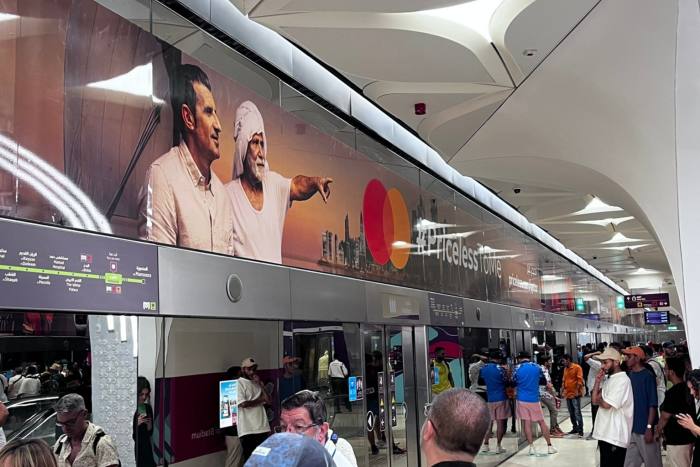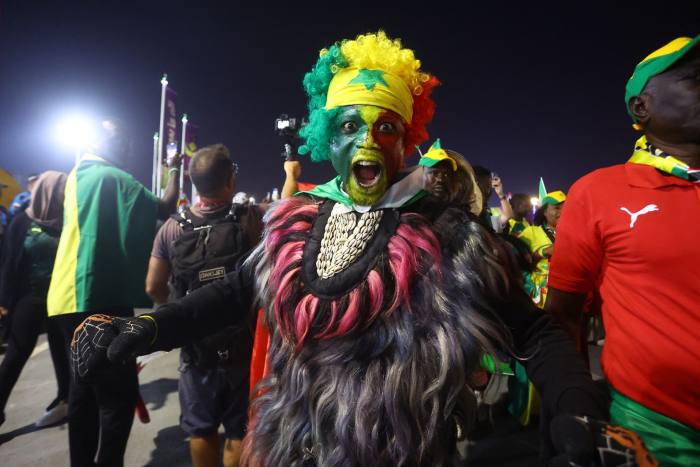[ad_1]
This article is an online version of our Scoreboard newsletter. Sign up here to get the newsletter sent straight to your inbox every Saturday
We’ve had a chance to look at every team competing at the World Cup here in Qatar. Argentina’s shock loss has been the biggest headline on the pitch so far, followed by Germany’s defeat at the hands of Japan. Spain look like contenders, while Brazil remain the favourites after Richarlison’s wonder strike got them off to a winning start.
We’ll be discussing the outcome of the World Cup — and much more — at the next instalment of our Business of Football Summit on March 1-2 2023. As a Scoreboard subscriber, you can sign up for your complimentary digital pass using promo code PREMIUM23 or save £400 on your in-person pass to join us at The Biltmore Mayfair, on March 2. Register here.
Back to the present — and the news this week that the world of football had been gossiping about for months: Manchester United is potentially for sale. We explain the pitch to potential bidders and strategic partners. Plus, we look at how global brands are trying to ride the World Cup wave with their own unofficial marketing campaigns. Do read on – Josh Noble, sport editor
Send us tips and feedback at scoreboard@ft.com. Not already receiving the email newsletter? Sign up here. For everyone else, let’s go.
How Manchester United, Beckham and fans explain juicy valuations
Manchester United is just one of those brands. Even in a burning-hot market for sports assets, the Glazer family’s decision to consider the sale of the club has put the world’s investors and media on red alert.
United’s history is full of highs and lows. The tragic Munich air disaster in February 1958 earned the world’s sympathy when eight Manchester United players were among 23 lives lost. The club’s recovery over the next decade culminated in winning the European Cup with the “Holy Trinity” of George Best, Denis Law and Bobby Charlton in attack.
But the team disbanded and United failed to win English’s top league for 26 years until Sir Alex Ferguson masterminded the 1992/93 title victory. In 1999, United won the treble of the league, FA Cup and Champions League, the only time an English club has done so. The Glazers acquired United in a leveraged buyout in 2005 but success kept coming thanks to the rise of Cristiano Ronaldo.
Since Ferguson’s retirement in 2013, United are closing in on a decade without a league title. Ronaldo returned last year but struggled to restore the team’s fortunes. The Portuguese superstar negotiated an early release from his contract after criticising the Glazers and the club for failing to evolve since Ferguson’s exit.
But despite the turmoil and failures on the pitch, United has a story to tell. And it’s worth big money. The club’s share price is up more than 65 per cent this week, valuing its equity at around $3.5bn. Although it’s still too early to determine how much someone might pay, the club could be worth even more if the right bidders turn up.
David Beckham, who played a critical role in United’s treble-winning season, is open to conversations with potential bidders. Beckham is proof that United is where celebrities — and stories — are made.
The onus is on Raine Group, the merchant bank that handled the £2.5bn auction of rivals Chelsea FC this year, to present United as a content factory with its claimed 1.1bn fans and followers rather than a mere football club. That’s how to attract a different profile of buyer to the usual queue of private equity investors and billionaires.
In this analysis, the FT asks what United is really worth and if Raine can convince media platforms, computer game developers and e-commerce companies to look at United in a new light.
The growth of the English Premier League’s broadcast revenues, United’s deep trove of intellectual property (that’s practically limitless video content) and global army of fans could be key to creating competitive tension in any eventual auction. The outcome will be a defining moment for the sports business.
World Cup 2022: a branding battleground
Anyone using the Doha Metro right now will struggle to escape the image of Luis Figo, the former Portuguese superstar, chomping down olives. His face is plastered all over the city’s new transit network, peering down on passengers waiting to board the driverless trains. The gleaming towers of Doha’s West Bay peek from the background, as Figo gets directions from a local fisherman. It’s all part of an ad campaign from payments provider Mastercard, designed to steal the thunder of official World Cup sponsor Visa.
This is what those in the industry might refer to as ambush marketing — a clever (or sneaky) way of piggybacking off a major event without becoming a sponsor. The trick is to steer clear of any protected copyrights and rely on subtle visual cues. It is a long-standing tradition at World Cups and most other sporting mega-events.
There’s also a little bit of history here. Mastercard was a World Cup partner until Fifa switched to Visa for the 2010 tournament. Mastercard sued, with the dispute ultimately ending in a $90mn settlement.
At this World Cup, other non-sponsors are looking to benefit. Coca-Cola has been one of Fifa’s most important commercial partners since 1974. Stadium concession stands in Qatar offer only Coke, Sprite and the company’s local water brand Arwa — alongside alcohol-free beer from fellow sponsor Budweiser. If you want any of it, you’ll have to pay with Visa, of course.
Yet Pepsi, Coca-Cola’s great rival, is jumping on the World Cup bandwagon. Its latest TV ad features Lionel Messi, Paul Pogba and Ronaldinho all trying to nutmeg as many people as possible in a generic Middle Eastern bazaar. There is no mention of Qatar, Fifa, or the World Cup. But viewers get the connection.
“All of these brands have great lawyers and great budgets, and they choose to pretend to be sponsors”, says Ricardo Fort, an independent consultant who previously ran sponsor relations for both Visa and Coca-Cola. “As long as you’re not using any trademarked iconography, it’s all legal.”
Things can go awry. At the South Africa World Cup in 2010, a group of women were detained for wearing orange dresses at a game. Fifa accused them of promoting an unauthorised beer brand, Bavaria. The company denied any involvement.
Fifa offers sponsors protection against ambush marketing — giving them designated spaces where no other brands can advertise, and trademarked images, such as of stadiums or the World Cup trophy, to use in promotions. Whether consumers can tell the difference is another matter.
The best of the FT’s World Cup coverage this week
-
The Qatar World Cup experience is different to anything that has come before. After some teething troubles, fans are beginning to find their rhythm. But many complain about a lack of atmosphere.
-
Instead, many are choosing to base themselves in Dubai, an hour’s flight away, where alcohol is more readily available and the vibe a bit more fun in general.
-
Can Argentina and Messi bounce back? The early second-favourites to win the tournament suffered a humiliating defeat against Saudi Arabia in their opening match. On Saturday, they will need to beat Mexico. Simon Kuper looks at their prospects.
-
Simon has also written a column about his time on the ground in Doha, and how the real World Cup experience happens in living rooms and pubs around the world.
Highlights
-
Silverlake has increased its stake in Manchester City’s parent group to more than 18 per cent, with City Football Group shares held by Chinese investors now down to almost zero.
-
Lars Windhorst agreed to sell his majority stake in German football club Hertha Berlin to US investment firm 777 Partners. The Miami-based group already has holdings in Genoa FC and Sevilla.
-
Cristiano Ronaldo has walked away from Manchester United, ending a difficult return to the club. In Portugal’s opening match against Ghana on Thursday, he became the first male player to score in five World Cups.
-
German retailer Rewe suspended its links to the German football federation after a row with Fifa over whether European teams could wear rainbow armbands during their World Cup matches.
Final Whistle
Give Mexico the trophy now pic.twitter.com/U31eIipWe7
— FootballJOE (@FootballJOE) November 24, 2022
If you ever needed a reminder that football is nothing without the fans, look no further than the World Cup itself. Fans have flown in from just about everywhere just to support their national teams. In fact, some of their exploits should probably count towards winning the trophy.
This video starts out serious. By the end, the Mexicans are having all the fun. Give Mexico the trophy now?
Anyway, that’s enough horsing around.
Until next week!
Scoreboard is written by Josh Noble, Samuel Agini and Arash Massoudi in London, Sara Germano, James Fontanella-Khan, and Anna Nicolaou in New York, with contributions from the team that produce the Due Diligence newsletter, the FT’s global network of correspondents and data visualisation team
[ad_2]
Source link




